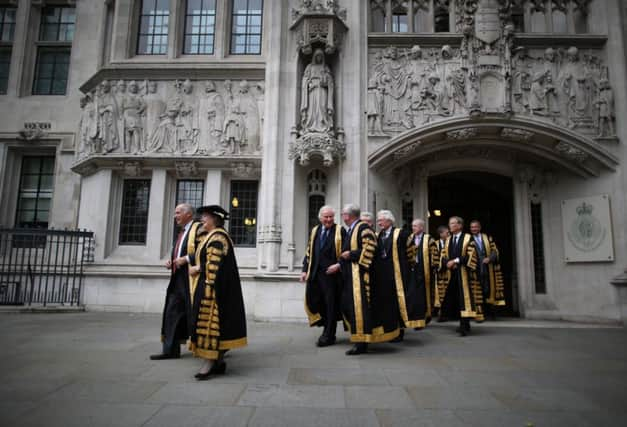An appeal for the court of last resort


The constitutional future of Scotland appears to be swirling around options of devo max, status quo or independence/separation from the UK. The Scottish Law Agents Society has considered whether the future of the Supreme Court is also in the mix. Certainly, the Scottish Government white paper proposes the simple excision of that court from the Scottish legal system.
There may be certain difficulties with this. The Court of Session, now proposed as the final court of appeal for civil cases in Scotland, was never previously a court of final appeal. Even prior to the Union of 1707, there was always a final appeal beyond the court, to the Scottish Parliament. That right of appeal appears to have transmitted in civil cases to the House of Lords (now the Supreme Court) following the Union and, to a limited extent, in criminal cases following the Scotland Act 1998.
Advertisement
Hide AdAdvertisement
Hide AdIt seems somewhat counter-intuitive that the right of appeal in Scotland should have a lesser scope in the 21st century than was available in the 17th century. Also, the Court of Session operates as a court of first instance as well as an appeal court. Many cases would therefore start and finish within the Court of Session. This may be seen as contrary to the modern trend towards independent and transparent review.
Has this right of appeal “furth of Scotland” been beneficial or detrimental? Certainly, the House of Lords for many years was seen as simply applying English law to Scottish cases, contrary to the Treaty of Union. That is perhaps less likely nowadays and two more modern cases may be instructive.
In 1932, the Court of Session Inner House dismissed the proposition that manufacturers of foodstuffs should be liable to the ultimate consumer for harmful contents accidentally included in the product (The Snail in the Bottle or Donoghue v Stevenson). On appeal, the House of Lords reversed the decision of the Inner House and found the manufacturer was liable for damages in such cases.
This decision has become celebrated in many countries including England, the US, Canada and Australia as the foundation of the modern law of negligence – a small step for a snail but a huge leap for Scottish and world jurisprudence. More pertinent to the current issue is the fact that a majority of the English judges in the House of Lords sided with and upheld the Inner House and it was the two Scottish judges in the House of Lords who provided the majority that reversed the Inner House and heralded a revolution in the law of negligence.
In another more recent case, Cadder v HMA 2010, the Scottish courts were satisfied that a person suspected of an offence was sufficiently safeguarded by the justice system so that evidence obtained by police interview without legal representation could be relied upon for the purposes of conviction.
On appeal, when the House of Lords found otherwise, it was a Scottish judge who stated “it is remarkable that…nobody thought that there was anything wrong with the procedure” and accused persons are now routinely entitled to legal representation at such interviews. One might or might not agree with these decisions but the important contribution to modern jurisprudence of Scottish appeals to the House of Lords/Supreme Court cannot be denied. The participation and contribution of the Scottish judges in such cases tend to detract from the argument that these cases merely foist unwelcome English law on the Scottish courts.
Where does the appellate jurisdiction of the Supreme Court stand with the independence of the Scottish courts as guaranteed by the Treaty of Union? In 1986, an injunction was issued at the High Court in London to prevent the publication of a letter written privately by a government official, a sort of early day Wikileak. Westminster was alerted only late in the day that the English injunction would not operate in Scotland. A fast car was sent to Edinburgh, arriving at 5am at the home of a Scottish judge. Unwilling to entertain legal proceedings in his pyjamas, the worthy judge duly convened a court at his home but only after donning proper judicial robes. The injunction was duly authorised to operate as a Scottish interdict – but not in time to stop a Glasgow newspaper from publishing the offending document. This was one of many demonstrations of the separate and independent status of the Scottish legal jurisdiction within the United Kingdom, notwithstanding 300 years of appeals to Westminster.
• Michael Sheridan is secretary of the Scottish Law Agents Society
SEE ALSO